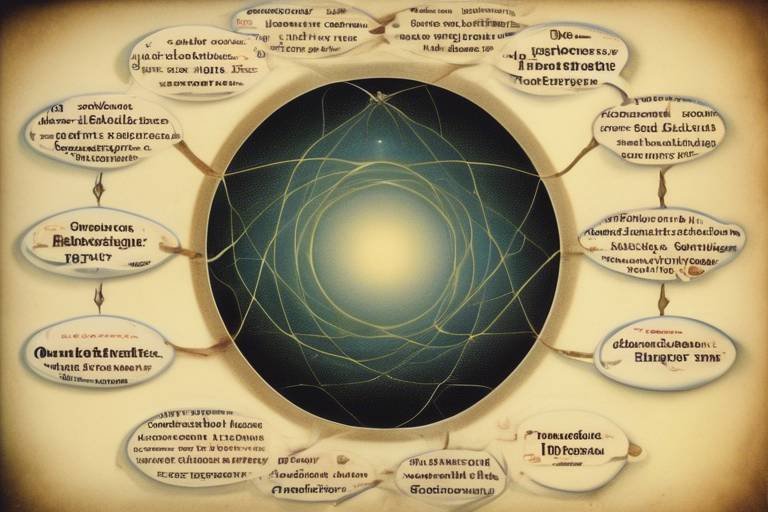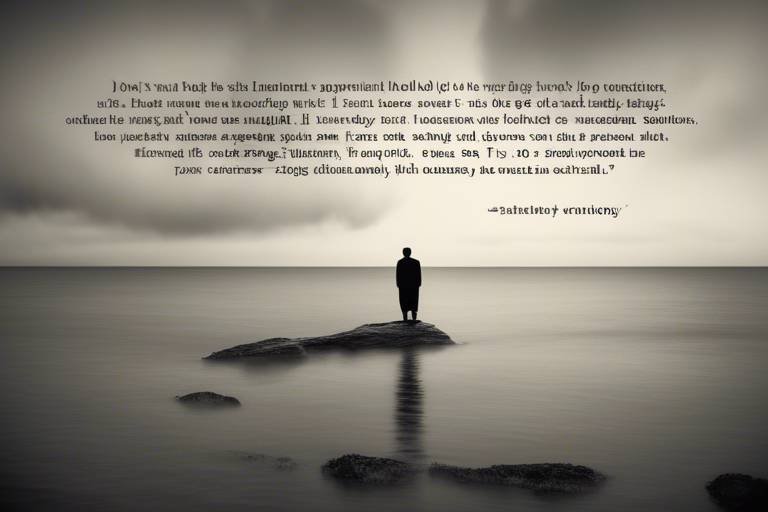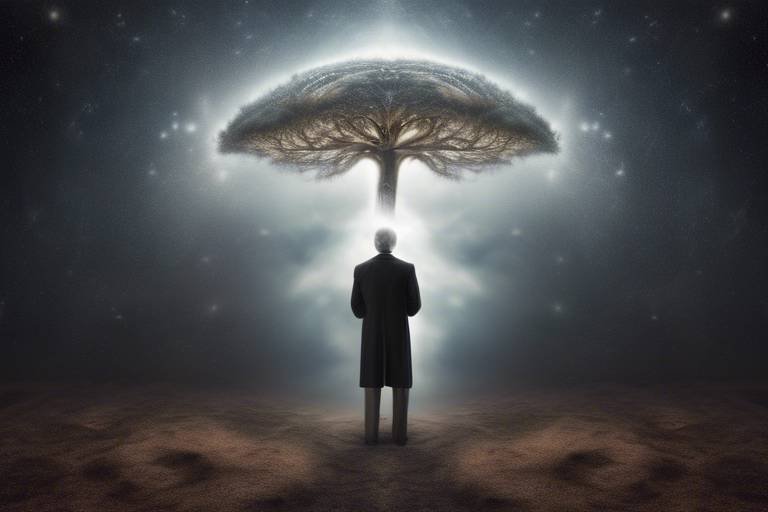The Influence of Ontology on Belief Systems
This article explores how ontology shapes belief systems, examining various perspectives and implications for understanding reality, knowledge, and existence. When we dive into the intricate world of ontology, we are essentially peeling back the layers of what it means to exist. Think of ontology as the foundation of a house; without a solid base, the structure above it is bound to falter. In a similar vein, our beliefs and perceptions of reality are built upon the ontological assumptions we hold. These assumptions dictate not only what we consider to be real but also how we interact with the world around us.
To grasp the full impact of ontology on belief systems, we must first understand the essence of both concepts. Ontology, as a branch of philosophy, delves into the nature of being and existence. It asks profound questions like, "What is real?" and "What entities populate our universe?" On the other hand, belief systems are the frameworks through which we interpret our experiences and make sense of our surroundings. They encompass our values, principles, and worldviews, all of which are significantly influenced by our ontological perspectives.
As we navigate through this exploration, we will uncover how different types of belief systems—religious, philosophical, and scientific—reflect distinct ontological assumptions. For instance, a religious belief system might posit a divine creator, while a scientific framework might rely on empirical evidence and rationality. Each perspective offers a unique lens through which adherents view existence and truth. By examining these various frameworks, we can better appreciate the complex interplay between ontology and belief, and how they shape our understanding of reality.
Ontology is the philosophical study of being and existence. It investigates what entities exist and how they can be categorized, influencing our understanding of reality and belief systems. At its core, ontology seeks to answer questions that have puzzled humanity for centuries. What does it mean to exist? How do we categorize the myriad entities in our universe? These inquiries are not just academic; they have profound implications for how we perceive our lives and the world around us.
Belief systems are frameworks of understanding that guide individuals' perceptions of reality. They encompass values, principles, and worldviews, significantly shaped by ontological perspectives. Our belief systems serve as lenses through which we interpret our experiences. They help us navigate the complexities of life, providing meaning and context to our existence. Without a belief system, one might feel adrift, lacking a coherent understanding of the world. This underscores the importance of ontology in shaping our beliefs, as the assumptions we hold about existence directly inform our values and principles.
Various belief systems exist, including religious, philosophical, and scientific frameworks. Each type reflects different ontological assumptions, influencing how adherents perceive existence and truth. For example:
- Religious Belief Systems: Often incorporate specific ontological views regarding the divine, creation, and the afterlife, shaping followers' understanding of their place in the universe.
- Philosophical Belief Systems: Engage with fundamental questions of existence, reality, and knowledge, often reflecting diverse ontological theories that inform human thought and understanding.
- Scientific Belief Systems: Rely on empirical evidence and rationality, guided by ontological assumptions about the nature of reality, causation, and the universe's workings.
Ontology and belief systems interact dynamically, as ontological assumptions can validate or challenge existing beliefs, leading to shifts in understanding and perception of reality. For instance, when new scientific discoveries challenge traditional religious beliefs, it can lead to a reevaluation of ontological assumptions. This interplay is crucial as it highlights the fluidity of our understanding of existence.
Examining specific case studies reveals how ontological shifts have historically influenced belief systems, demonstrating the profound impact of philosophical inquiry on societal values and norms. For example, the Enlightenment period sparked significant changes in how people viewed the world, leading to a decline in religious dogma and a rise in scientific reasoning. This shift not only altered individual belief systems but also reshaped societal norms and values.
The influence of ontology on belief systems has significant implications for societal cohesion, conflict resolution, and cultural evolution, shaping collective identities and worldviews. Understanding these dynamics can provide insights into contemporary issues such as religious conflict, scientific skepticism, and philosophical debates. By recognizing the underlying ontological assumptions that drive these beliefs, we can foster dialogue and promote understanding among diverse groups.
- What is ontology? Ontology is the philosophical study of being and existence, exploring what entities exist and how they can be categorized.
- How do belief systems relate to ontology? Belief systems are frameworks shaped by ontological perspectives, guiding how individuals perceive reality and truth.
- Can ontological shifts change belief systems? Yes, ontological shifts can challenge or validate existing beliefs, leading to changes in understanding and perception of reality.
- What are some examples of belief systems? Examples include religious, philosophical, and scientific frameworks, each reflecting different ontological assumptions.

Understanding Ontology
Ontology is a fascinating branch of philosophy that dives deep into the essence of being and existence. Imagine standing at the edge of a vast ocean, where every wave represents a different entity or concept. Just like the ocean, ontology seeks to explore what lies beneath the surface of our understanding. It poses critical questions: What entities exist? How do we categorize them? And, perhaps most intriguingly, what does it mean for something to 'be'? These inquiries are not just academic; they shape our perceptions of reality and influence our belief systems in profound ways.
At its core, ontology is concerned with the nature of reality. It examines the fundamental categories of existence and the relationships between various entities. For instance, consider the difference between a physical object, like a tree, and an abstract concept, like love. Ontology helps us understand how these different types of entities coexist and interact within our perception of the world. This understanding is crucial because it lays the groundwork for how we interpret our experiences and the world around us.
To illustrate this, let’s break down some key ontological concepts that are often discussed:
- Existence: What does it mean for something to exist? Is existence a binary state, or can it be more nuanced?
- Categories of Being: How do we classify entities? Are there different levels or types of existence?
- Identity and Change: How do entities maintain their identity over time, especially when they undergo changes?
These questions are not merely theoretical; they have real-world implications. For example, consider how different cultures and societies have varying ontological frameworks. Some may view the world through a lens of dualism (mind vs. body), while others may embrace a more holistic approach. Such differences can lead to diverse interpretations of existence and influence everything from moral values to social structures.
Moreover, ontology does not exist in a vacuum. It interacts dynamically with other philosophical disciplines, such as epistemology, which is the study of knowledge. The way we understand existence can significantly affect our beliefs about what we can know and how we acquire knowledge. This interplay highlights the importance of ontology in shaping our broader belief systems.
In summary, ontology is more than just a philosophical concept; it is a lens through which we can view and interpret our reality. By understanding the fundamental nature of existence, we gain insights into how our beliefs are formed, challenged, and transformed over time. This understanding is vital not only for individual growth but also for fostering a more cohesive society where diverse perspectives can coexist and thrive.

Belief Systems Defined
Belief systems are the frameworks of understanding that shape how individuals perceive the world around them. They are not merely collections of ideas but rather intricate networks of values, principles, and worldviews that guide our thoughts and actions. Imagine them as the lens through which we view reality; they color our interpretations and influence our decisions. Just as a painter chooses specific colors to create a masterpiece, our belief systems determine how we interpret experiences, relationships, and even our own existence.
At their core, belief systems help us navigate the complexities of life. They provide answers to fundamental questions like "What is the meaning of life?" or "What happens after we die?" These frameworks can be deeply personal or widely shared within communities, often defining cultural identities. For instance, a person's religious beliefs may dictate their moral compass, while a scientific worldview may lead them to prioritize empirical evidence over tradition. This interplay between personal experience and societal norms creates a rich tapestry of belief systems.
Belief systems can be categorized into several broad types, each reflecting different ontological assumptions:
- Religious Belief Systems: These often include faith in a higher power, sacred texts, and doctrines that guide moral and ethical behavior.
- Philosophical Belief Systems: These engage with existential questions and often include various schools of thought that challenge or affirm different views of reality.
- Scientific Belief Systems: Grounded in observation and experimentation, these rely on evidence and rationality to explain the world.
Understanding belief systems is crucial not only for personal growth but also for fostering social cohesion. They help individuals find common ground with others, creating shared values and collective identities. However, they can also lead to conflict when differing belief systems clash. This dynamic highlights the importance of recognizing and respecting the diverse belief systems that exist within our global community.
In summary, belief systems are integral to human experience, shaping our understanding of reality and influencing our interactions with the world. They are not static; they evolve over time, adapting to new information and experiences. This fluidity invites us to continually examine our beliefs, question their foundations, and consider how they align with our understanding of existence.

Types of Belief Systems
Belief systems are as diverse as the people who hold them, and they can be categorized into several distinct types. Each belief system serves as a lens through which individuals interpret their experiences and understand the world around them. To grasp the full scope of these systems, we can primarily identify three major categories: religious, philosophical, and scientific belief systems. Each type is rooted in different ontological assumptions, shaping how adherents perceive existence, truth, and their place in the universe.
Religious belief systems often provide followers with a comprehensive worldview that includes the nature of the divine, the purpose of life, and the afterlife. These systems are typically grounded in sacred texts, traditions, and teachings that convey specific ontological views. For example, many religions posit the existence of a higher power or powers, which fundamentally influences the moral and ethical frameworks of their adherents. This divine perspective can create a sense of belonging and purpose, guiding individuals in their daily lives.
On the other hand, philosophical belief systems delve into the fundamental questions of existence and reality without necessarily relying on divine authority. Philosophers ponder concepts such as what it means to exist, the nature of knowledge, and the relationship between mind and matter. These inquiries lead to various ontological theories, from materialism to idealism, each offering a unique interpretation of reality. The beauty of philosophical belief systems lies in their ability to foster critical thinking and open-mindedness, encouraging individuals to challenge their assumptions and explore new ideas.
Scientific belief systems, in contrast, are grounded in empirical evidence and rationality. They rely on observation, experimentation, and the scientific method to understand the universe. The ontological assumptions here often revolve around the principles of causation and the existence of a physical reality that can be measured and tested. For instance, the scientific community generally operates under the assumption that the universe is governed by natural laws, which can be discovered through rigorous inquiry. This approach not only enhances our understanding of the world but also fuels technological advancements and innovations.
In summary, the interplay between these types of belief systems is complex and multifaceted. Each system reflects different ontological perspectives that shape how individuals perceive their reality. Understanding these distinctions is crucial as it allows us to appreciate the rich tapestry of human thought and the diverse ways in which we seek meaning and understanding in our lives.
- What is the primary difference between religious and philosophical belief systems?
Religious belief systems often center around divine authority and sacred texts, while philosophical belief systems focus on critical thinking and inquiry into existence without relying on religious doctrines. - Can belief systems change over time?
Yes, belief systems can evolve as individuals encounter new experiences, information, and perspectives, leading to shifts in their understanding of reality. - How do scientific belief systems influence society?
Scientific belief systems promote a reliance on evidence and rationality, which can lead to technological advancements and informed decision-making in various societal issues.

Religious Belief Systems
Religious belief systems represent a profound aspect of human culture, deeply intertwined with our understanding of existence, morality, and the universe. These systems often provide a framework through which adherents interpret their experiences and make sense of their lives. At the core of many religious belief systems lies a set of ontological assumptions about the nature of the divine, creation, and the afterlife. For instance, in Christianity, there is a belief in an omnipotent God who created the universe, while in Buddhism, the focus is on the cyclical nature of existence and the pursuit of enlightenment.
Moreover, religious beliefs can significantly shape ethical values and social norms, guiding followers in their daily lives. The ontological perspectives embedded in these systems often dictate how individuals perceive concepts such as good and evil, justice, and the purpose of life. For example, consider the contrasting views on morality between monotheistic religions, which often view moral laws as divinely ordained, and polytheistic religions, which may see morality as more fluid and culturally specific.
Religious belief systems can also foster a sense of community and belonging among their followers. Rituals, traditions, and shared beliefs create a bond that can transcend individual differences. This communal aspect is crucial, as it reinforces the belief system's ontological assumptions and provides a collective identity. However, it can also lead to exclusivity, where those outside the belief system may be viewed with skepticism or hostility, highlighting the complex interplay between ontology and social dynamics.
To illustrate the diversity of religious belief systems, let's look at a comparative table that outlines some key ontological views across different religions:
| Religion | Ontological View | Key Beliefs |
|---|---|---|
| Christianity | Monotheism | Belief in one God, salvation through Jesus Christ, and life after death. |
| Buddhism | No creator deity | Focus on enlightenment, the Four Noble Truths, and the cycle of rebirth. |
| Hinduism | Polytheism | Belief in multiple deities, karma, and moksha (liberation from the cycle of rebirth). |
| Islam | Monotheism | Belief in one God (Allah), the prophethood of Muhammad, and the afterlife. |
In summary, religious belief systems are not just collections of doctrines; they are intricate webs of ontological assumptions that shape how individuals and communities perceive their existence and interact with the world. They offer answers to existential questions and provide a moral compass for many, illustrating the profound influence of ontology on belief systems.

Philosophical Belief Systems
Philosophical belief systems are like the compass that guides our understanding of existence, reality, and knowledge. They delve deep into the fundamental questions that have puzzled humanity for centuries: What is real?, What can we know?, and What does it mean to exist? Unlike more rigid frameworks, philosophical belief systems offer a spectrum of perspectives, encouraging individuals to explore various ontological theories that shape their worldview.
At the heart of philosophical inquiry lies the exploration of different ontologies. These can range from materialism, which posits that only physical matter exists, to idealism, suggesting that reality is fundamentally mental or spiritual. This diversity creates a rich tapestry of thought, where each belief system reflects unique assumptions about the nature of reality. For instance, existentialism, a popular philosophical movement, emphasizes individual experience and the inherent meaninglessness of life, prompting adherents to create their own meaning within an indifferent universe.
Moreover, philosophical belief systems often challenge individuals to confront their own assumptions and biases. They encourage a critical examination of the world around us, fostering a mindset that questions societal norms and values. This questioning can lead to profound personal transformations, as individuals grapple with their beliefs and the ontological foundations that support them. For example, consider how skepticism invites us to doubt commonly accepted truths, urging us to seek evidence and reason before forming conclusions. This process not only enriches our understanding but also cultivates a culture of inquiry and dialogue.
The interplay between philosophy and ontology is particularly evident in the works of great thinkers throughout history. Philosophers like Plato and Aristotle laid the groundwork for Western thought, proposing ontological frameworks that have influenced countless belief systems. Their ideas continue to resonate today, shaping contemporary discussions around metaphysics, ethics, and epistemology. As we engage with these philosophical traditions, we find that our beliefs are not mere opinions but are deeply rooted in complex ontological structures that warrant exploration.
In conclusion, philosophical belief systems serve as a vital lens through which we can examine our understanding of reality. They challenge us to think critically, embrace uncertainty, and engage with the profound questions of existence. By exploring these systems, we not only enrich our own perspectives but also contribute to a broader dialogue about the nature of reality and our place within it.
- What is the main purpose of philosophical belief systems?
The main purpose is to explore fundamental questions about existence, reality, and knowledge, encouraging critical thinking and personal growth.
- How do philosophical beliefs differ from religious beliefs?
Philosophical beliefs often focus on rational inquiry and critical examination, while religious beliefs may rely on faith and spiritual doctrines.
- Can philosophical belief systems change over time?
Yes, as individuals encounter new ideas and experiences, their philosophical beliefs can evolve, reflecting a deeper understanding of reality.

Scientific Belief Systems
Scientific belief systems are fascinating constructs that rely heavily on empirical evidence and rational thought. Unlike religious or philosophical belief systems, which might lean more on faith or abstract reasoning, scientific beliefs are grounded in observable phenomena. This means that they evolve constantly, adapting to new discoveries and insights. Imagine a tree that grows taller and broader with each new branch representing a breakthrough in understanding—this is how scientific belief systems function.
At the core of scientific belief systems lies the scientific method, a systematic approach to inquiry that involves observation, experimentation, and analysis. This method serves as a guiding principle for scientists and researchers, allowing them to formulate hypotheses and test them rigorously. The beauty of this system is that it encourages skepticism and curiosity, urging individuals to question existing knowledge and seek out the truth based on evidence.
To illustrate how scientific belief systems operate, consider the following key components:
- Empiricism: The belief that knowledge is primarily derived from sensory experience. This principle emphasizes observation and experimentation as the basis for understanding.
- Falsifiability: A concept introduced by philosopher Karl Popper, it asserts that for a theory to be scientific, it must be testable and capable of being proven false.
- Peer Review: A critical process in which scientific findings are evaluated by other experts in the field before publication. This ensures that research is scrutinized and validated by the scientific community.
These components work together to form a robust framework that not only seeks to explain the natural world but also challenges existing beliefs. For instance, the shift from a geocentric (Earth-centered) view of the universe to a heliocentric (Sun-centered) model exemplifies how scientific inquiry can radically alter our understanding of existence. Such shifts are not merely academic; they have profound implications for how we see ourselves in relation to the cosmos.
Moreover, scientific belief systems are not static; they are dynamic and continually evolving. As new technologies emerge and new data is collected, our understanding of reality can shift dramatically. Take, for example, the advancements in quantum physics. Concepts that once seemed abstract or counterintuitive have now become integral to our understanding of the universe at a fundamental level. This continuous evolution is what distinguishes scientific belief systems from more rigid frameworks.
In conclusion, scientific belief systems represent a unique intersection of inquiry, evidence, and understanding. They invite us to explore the unknown, challenge our assumptions, and embrace the complexities of existence. As we continue to uncover the mysteries of the universe, these belief systems will undoubtedly evolve, shaping our collective understanding of reality while inspiring future generations to question, investigate, and discover.
- What is the scientific method? The scientific method is a systematic approach to inquiry that involves observation, hypothesis formation, experimentation, and analysis to derive conclusions.
- How do scientific beliefs differ from religious beliefs? Scientific beliefs are based on empirical evidence and are subject to change with new discoveries, while religious beliefs often rely on faith and tradition.
- Can scientific beliefs change over time? Yes, scientific beliefs can and do change as new evidence emerges and our understanding of the universe expands.

The Interplay of Ontology and Beliefs
When we dive into the intricate relationship between ontology and belief systems, we uncover a fascinating dynamic that shapes how we perceive and interpret our reality. Think of ontology as the foundation of a house; it defines the structure and stability of our beliefs. Just as a house needs a solid foundation to stand tall, our belief systems rely on ontological assumptions to give them meaning and coherence. This interplay is not static; rather, it's a fluid dance where each influences the other, often leading to profound shifts in our understanding of existence.
At its core, ontology asks the fundamental questions: What exists? How do we categorize these entities? These inquiries directly inform our belief systems, which are frameworks that help us navigate the complexities of life. For instance, if someone holds a belief in a materialistic ontology, they may perceive the universe as a collection of physical entities governed by natural laws. This perspective can lead to a belief system grounded in scientific rationalism, where empirical evidence is paramount.
On the flip side, consider a person who subscribes to a spiritual ontology. This individual may believe in the existence of non-material entities, such as spirits or energies, which profoundly shapes their worldview. Their belief system might include practices like meditation or rituals, reflecting a deep connection to the unseen aspects of existence. Here, ontology serves as the lens through which they interpret their experiences and interactions with the world.
Moreover, the interplay between ontology and beliefs can lead to significant societal changes. When a dominant ontological perspective shifts—such as the transition from a geocentric to a heliocentric view of the universe—entire belief systems can be challenged or transformed. The scientific revolution is a prime example, where new ontological insights about the cosmos led to a reevaluation of long-held beliefs about humanity's place in the universe. This shift not only altered individual perspectives but also reshaped cultural norms and values.
Interestingly, this dynamic is not always harmonious. Conflicting ontological assumptions can lead to tension and strife. For instance, consider the clash between scientific and religious ontologies. While science often emphasizes empirical evidence and observable phenomena, many religious belief systems are rooted in faith and divine revelation. This fundamental difference can create friction, as adherents to each perspective may struggle to reconcile their views with those of the other. Such conflicts highlight the importance of understanding the underlying ontological beliefs that fuel these debates.
In summary, the interplay of ontology and beliefs is a rich tapestry woven from the threads of existence, knowledge, and perception. By examining how these elements interact, we gain deeper insights into not only our individual belief systems but also the broader societal implications. As we navigate this complex landscape, we must remain open to the possibility that our ontological assumptions can evolve, leading to transformative shifts in our understanding of reality.
- What is ontology? Ontology is the philosophical study of being and existence, exploring what entities exist and how they can be categorized.
- How do belief systems form? Belief systems form as frameworks that guide individuals' perceptions of reality, shaped by various factors including cultural, social, and ontological influences.
- Can ontological shifts change belief systems? Yes, shifts in ontological perspectives can lead to significant changes in belief systems, influencing how individuals and societies understand existence and truth.
- What are some examples of belief systems? Examples include religious, philosophical, and scientific belief systems, each reflecting different ontological assumptions.

Case Studies
When we delve into the intricate relationship between ontology and belief systems, examining specific case studies can illuminate the profound impact of ontological shifts on societal beliefs. One notable example is the transition from a geocentric to a heliocentric view of the universe. For centuries, the belief that the Earth was the center of the universe was not just a scientific stance; it was deeply entwined with religious and philosophical frameworks. This ontological perspective shaped not only scientific inquiry but also the very fabric of societal values and norms.
With the revolutionary ideas of figures like Copernicus and Galileo, the shift towards a heliocentric model challenged existing beliefs, prompting a reevaluation of humanity's place in the cosmos. This case exemplifies how ontological assumptions can validate or dismantle long-held beliefs, leading to a broader understanding of existence and reality.
Another compelling case study can be found in the realm of indigenous belief systems. Many indigenous cultures possess unique ontological perspectives that emphasize a deep connection between humans and nature. These beliefs shape their understanding of existence, knowledge, and moral values. For instance, the Maori of New Zealand have a concept known as whakapapa, which refers to genealogy and the interconnectedness of all living things. This ontological view fosters a sense of responsibility towards the environment and influences their practices in sustainability and conservation.
In contrast, the rise of modern scientific paradigms often leads to a clash with these indigenous belief systems. As scientific inquiry prioritizes empirical evidence and rationality, it can sometimes overlook or undervalue the ontological perspectives embedded in indigenous cultures. This tension raises important questions about cultural preservation and the validity of different ways of knowing. Understanding these dynamics is crucial for fostering dialogue and collaboration between diverse belief systems.
To further illustrate the interplay between ontology and belief systems, we can look at the impact of existential philosophy in the 20th century. Thinkers like Jean-Paul Sartre and Martin Heidegger challenged traditional ontological assumptions, emphasizing individual existence and subjective experience. Their ideas resonated with a generation grappling with the aftermath of World War II, leading to a shift in societal values towards personal freedom, authenticity, and existential responsibility. This ontological shift not only influenced philosophical discourse but also permeated literature, art, and popular culture, reshaping collective identities.
In summary, these case studies highlight the dynamic interplay between ontology and belief systems. They demonstrate that ontological shifts can profoundly influence societal values, norms, and individual perceptions of reality. As we continue to explore this relationship, it becomes clear that understanding ontology is essential for navigating the complexities of human belief and existence.

Implications for Society
The interplay between ontology and belief systems carries profound implications for society as a whole. When we think about how our understanding of existence shapes our beliefs, it becomes clear that these frameworks influence not only personal identities but also collective behaviors and societal norms. For instance, different ontological views can lead to varying interpretations of morality, ethics, and even laws. Imagine a society where the predominant belief system emphasizes individualism versus one that prioritizes collectivism; the resulting social dynamics would be strikingly different. This dichotomy can lead to both harmony and conflict, depending on how these beliefs are integrated into the fabric of society.
Furthermore, the influence of ontology on belief systems can significantly impact cultural evolution. As societies encounter new ideas, technologies, and philosophies, their ontological assumptions may shift, leading to a reevaluation of established beliefs. This process can be seen in historical movements such as the Enlightenment, which challenged traditional religious beliefs and promoted scientific inquiry. Such shifts can foster innovation and progress, but they can also provoke resistance and conflict, especially among groups that feel their foundational beliefs are under threat.
Moreover, the implications extend to social cohesion and conflict resolution. A society with diverse belief systems may experience tension if its members hold fundamentally different ontological views. For example, consider a community where some individuals believe in a deterministic universe while others advocate for free will. This fundamental disagreement can lead to misunderstandings and social fragmentation if not managed carefully. On the other hand, fostering dialogue around these differences can lead to greater empathy and understanding, ultimately strengthening community bonds.
To illustrate the impact of ontology on societal values, let’s consider a simple table that outlines the potential outcomes of differing ontological perspectives:
| Ontological Perspective | Potential Societal Outcome |
|---|---|
| Determinism | Focus on systemic change and social support systems |
| Free Will | Emphasis on personal responsibility and individual achievement |
| Religious Faith | Community building and shared moral frameworks |
| Scientific Rationalism | Promotion of critical thinking and evidence-based policies |
In conclusion, the implications of ontology on belief systems are far-reaching. They shape not only individual perspectives but also the collective identity of societies. Understanding these dynamics is crucial for navigating the complexities of modern life, where diverse beliefs coexist and often clash. By engaging in open dialogues and fostering mutual respect, societies can harness the power of these differences to create a more inclusive and harmonious world.
- What is ontology? Ontology is the philosophical study of being and existence, focusing on what entities exist and how they can be categorized.
- How do belief systems influence society? Belief systems shape individual and collective perceptions of reality, affecting values, ethics, and social norms.
- Can differing ontological views lead to conflict? Yes, differing ontological perspectives can create misunderstandings and tensions within a society, but they can also foster dialogue and empathy.
- What are some examples of belief systems? Belief systems can be religious, philosophical, or scientific, each reflecting different ontological assumptions.
Frequently Asked Questions
- What is ontology?
Ontology is the philosophical study of being and existence. It delves into what entities exist and how they can be categorized, shaping our understanding of reality.
- How do belief systems relate to ontology?
Belief systems are frameworks that guide how individuals perceive reality. They are significantly influenced by ontological perspectives, which help define what is considered true or real.
- What are some examples of different belief systems?
There are various belief systems, including religious, philosophical, and scientific frameworks. Each type reflects different ontological assumptions, affecting how adherents view existence and truth.
- How do religious belief systems incorporate ontology?
Religious belief systems often include specific ontological views about the divine, creation, and the afterlife, shaping followers' understanding of their role in the universe.
- What role do philosophical belief systems play in understanding existence?
Philosophical belief systems engage with fundamental questions about existence and reality, reflecting diverse ontological theories that inform human thought and understanding.
- How do scientific belief systems differ from religious and philosophical ones?
Scientific belief systems rely on empirical evidence and rationality, guided by ontological assumptions about the nature of reality, causation, and the workings of the universe.
- Can ontological assumptions challenge existing beliefs?
Yes! Ontological assumptions can validate or challenge existing beliefs, leading to shifts in understanding and perception of reality, which can significantly impact belief systems.
- What are some historical examples of ontological shifts influencing belief systems?
Examining specific case studies reveals how ontological shifts have historically influenced belief systems, showcasing the profound impact of philosophical inquiry on societal values and norms.
- What are the societal implications of the interplay between ontology and belief systems?
The influence of ontology on belief systems has significant implications for societal cohesion, conflict resolution, and cultural evolution, shaping collective identities and worldviews.



















